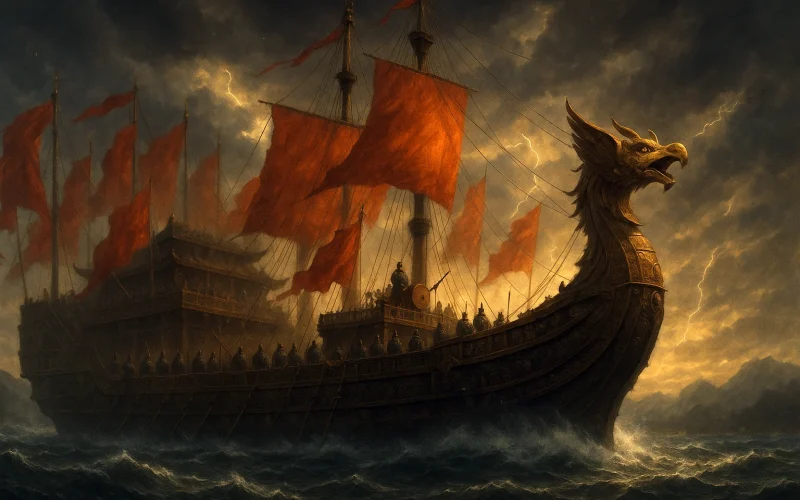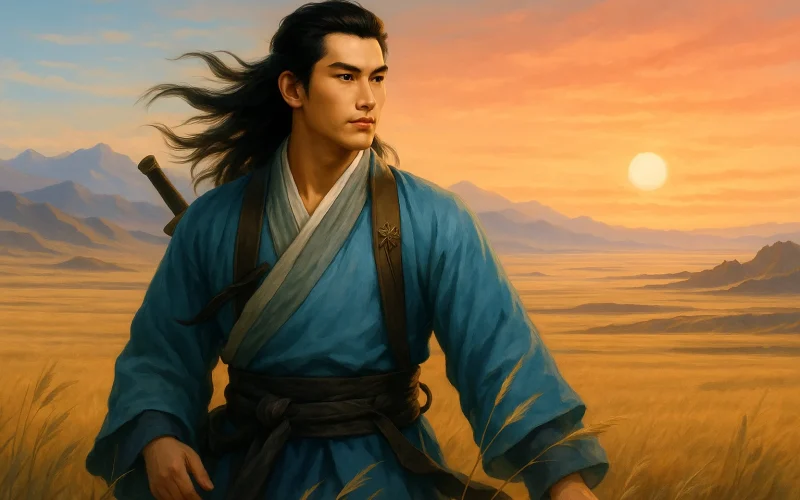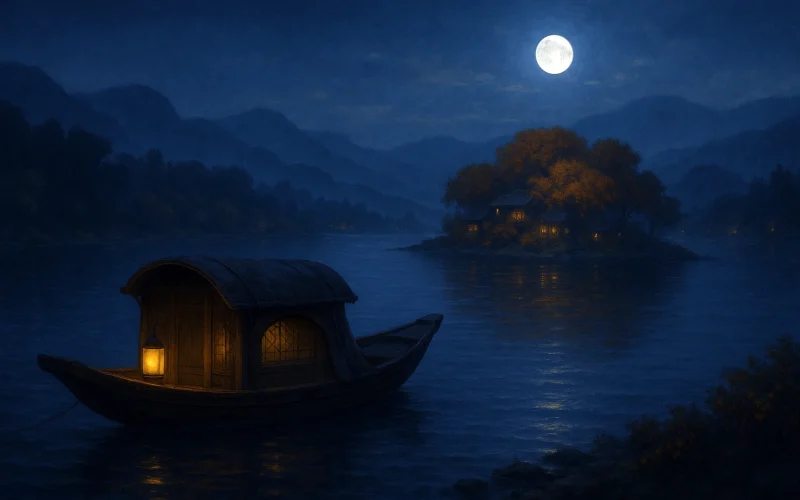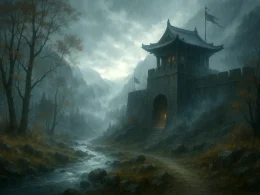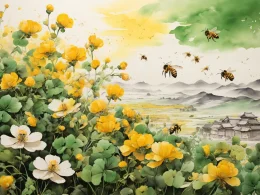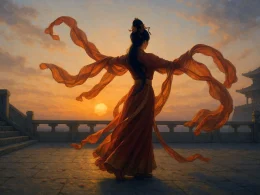Painted prows pierce the sky,
Red banners whirl like snow,
Sacred drums thunder nigh.
Alas! Qu Yuan drowned, exiled long ago—
His laments for ancient kings,
Mountains and streams brim with woe,
Elders grieve as sorrow clings.
The upright are cast aside,
The wise king long has died—
Can three clans truly Chu’s fate decide?
On the empty river,
Only mist and waves shiver,
While years flow on forever.
With cup in hand,
I gaze west, pacing slow—
Will loyal souls return to this land?
Vain are the races to seize the prize,
Where fish and dragons surge and rise,
Shouts summon courage bold,
Till earth splits and mountains fold.
Fragrant rice wrapped in silk thread,
Talismans pinned on mugwort spread—
Yet children’s hearts by wine are led.
Rise and fall are but a jest,
Left to fleeting clouds at best,
While I stand at heaven’s edge, unblest.
Original Poem
「沁园春 · 画鷁凌空」
画鷁凌空,红旗翻雪,灵鼍震雷。
叹沈湘去国,怀沙吊古,江山凝恨,父老兴哀。
正直难留,灵修已化,三户真能存楚哉。
空江上,但烟波渺渺,岁月洄洄。持杯。西眺徘徊。些千载忠魂来不来。
刘过
谩争标夺胜,鱼龙喷薄,呼声贾勇,地裂山摧。
香黍缠丝,宝符插艾,犹有樽前儿女怀。
兴亡事,付浮云一笑,身在天涯。
Interpretation
This work stands as a passionate outcry by Liu Guo**, the Southern Song Dynasty poet of anti-Jin resistance, composed during a time of national turmoil and fractured landscapes. The titular "painted war-junks" (画鷁), originally referring to ancient battleships adorned with mythical waterfowl motifs, here transform into symbols of unyielding national spirit and militant resolve. Through majestic imagery, the poet channels profound patriotic anguish and historical contemplation—simultaneously extolling loyalist ideals, condemning contemporary strife, and voicing boundless longing for lost homelands.
First Stanza: "画鷁凌空,红旗翻雪,灵鼍震雷。叹沈湘去国,怀沙吊古,江山凝恨,父老兴哀。正直难留,灵修已化,三户真能存楚哉。空江上,但烟波渺渺,岁月洄洄。"
Huà yì líng kōng, hóng qí fān xuě, líng tuó zhèn léi. Tàn shěn xiāng qù guó, huái shā diào gǔ, jiāng shān níng hèn, fù lǎo xīng āi. Zhèng zhí nán liú, líng xiū yǐ huà, sān hù zhēn néng cún chǔ zāi. Kōng jiāng shàng, dàn yān bō miǎo miǎo, suì yuè huí huí.
Painted prows pierce the skies,
vermilion banners whirl like winter gusts,
sacred drumbeats thunder across rivers.
I mourn Qu Yuan's exile—his stone-clasped drowning,
this land's accumulated grief,
the people's unending lament.
Where are the upright now? Saints turned to dust.
Could three households truly preserve Chu?
On vacant waters,
only mist-veiled waves remain,
time's endless circling.
The stanza erupts with martial grandeur: The soaring "painted prows", snow-swirled banners, and thunderous war-drums construct a monumental historical tableau. Abruptly pivoting to historical reflection, the poet invokes Qu Yuan典故 through "stone-clasped drowning" (怀沙)—channeling reverence for martyred loyalists while decrying their modern absence. The piercing rhetorical question "Could three households truly preserve Chu?" (三户存楚) references the legendary Chu loyalists, questioning whether any patriotic resolve remains. The concluding mist-shrouded river imagery mirrors the poet's isolation in an era of moral collapse, where cyclical time (岁月洄洄) seems to trap humanity in futility.
Second Stanza: "持杯。西眺徘徊。些千载忠魂来不来。谩争标夺胜,鱼龙喷薄,呼声贾勇,地裂山摧。香黍缠丝,宝符插艾,犹有樽前儿女怀。兴亡事,付浮云一笑,身在天涯。"
Chí bēi. Xī tiào pái huái. Xiē qiān zǎi zhōng hún lái bù lái. Màn zhēng biāo duó shèng, yú lóng pēn bó, hū shēng jiǎ yǒng, dì liè shān cuī. Xiāng shǔ chán sī, bǎo fú chā ài, yóu yǒu zūn qián ér nǚ huái. Xīng wáng shì, fù fú yún yī xiào, shēn zài tiān yá.
Winecup in hand,
gazing westward, pacing—
Will a thousand years' loyal ghosts return?
Futile competitions rage:
scaled monsters spume,
sham-courage shatters mountains,
all sound and fury.
Yet glutinous rice stays wrapped in reed leaves,
amulets hang with mugwort—
children still toast to martyrs.
Let dynasties rise and fall like clouds,
I'll laugh…
while stranded at world's edge.
Transitioning to lyrical meditation, the poet's winecup becomes a vessel for existential questioning. The haunting refrain "Will loyal ghosts return?" (忠魂来不来) underscores his despair over vanished heroism, while the grotesque imagery of "scaled monsters" (鱼龙) and "sham-courage" (贾勇) satirizes contemporary political theatrics. Amidst this decay, the Dragon Boat Festival rituals—reed-wrapped zongzi (香黍) and mugwort charms (艾符)—emerge as fragile threads connecting present to past. The final feigned nonchalance ("laugh at floating clouds") cracks to reveal the poet's exile (天涯)—a spatial and spiritual displacement where laughter cannot mask undimmed devotion.
Holistic Appreciation
This ci unfolds through a masterful structural progression—beginning with taut intensity before relaxing into contemplative depth, moving from vivid martial imagery to profound historical meditation, then culminating in lyrical realism. The first stanza deploys wartime symbolism and historical scars, invoking Qu Yuan and the fallen Chu kingdom to articulate the tragedy of unrecognized loyalty. The second stanza shifts to lyrical introspection, where the poet's westward gaze embodies both fury at ostentatious authority and hope for enduring virtue among the people.
The iconic line "I'd buy osmanthus and wine to relive old joys—yet never taste again my youth's adventures" achieves immortality not merely through melodic grace and wistful atmosphere, but by distilling humanity's most poignant emotions: nostalgia for lost youth, friendship and homeland, and aching acceptance of irretrievable golden eras. Similar sentiments pulse throughout this Qinyuanchun, particularly in the closing "Rise and fall of dynasties? Fling them to the wind with a laugh—here I stand at world's edge," where world-weary detachment wars with visceral anguish, forging a poem that blends heroic despair with unyielding spirit.
Artistic Features
- Layered Historical Allusions
References to Qu Yuan's "Embracing Sand" and Chu's collapse lend archaeological depth to contemporary grief. - Dramatic Emotional Juxtaposition
The opening's militant grandeur (ships, banners) clashes with the elegiac finale, mirroring psychological complexity. - Landscape as Emotional Palimpsest
River vistas, war junks and ritual offerings become vessels for layered sentiment—where every scene overwrites personal and collective memory. - Dual-Toned Diction
Majestic phrasing ("thunderous drums") coexists with delicate melancholy ("fragrant millet"), creating cognitive dissonance that mirrors the poet's torn psyche.
Insights
Beyond its patriotic lament, this work demonstrates how to preserve moral integrity amidst chaos. The poet's wine-toasted moons and verse-soothed spirits reveal a diasporic consciousness—physically adrift yet spiritually anchored. Those recurring motifs of loyal ghosts, lost landscapes and smoke-veiled years coalesce into transcendent sustenance, proving cultural continuity lives not in institutions but in the loyalties and obsessions etched in human hearts.
History shifts, rivers change course, yet through poetry, fidelity and compassion become timeless. As the ci teaches: eras may convulse, individuals may wander, but so long as spirit persists, the exiled soul needs no physical return—it is already home.
About the Poet
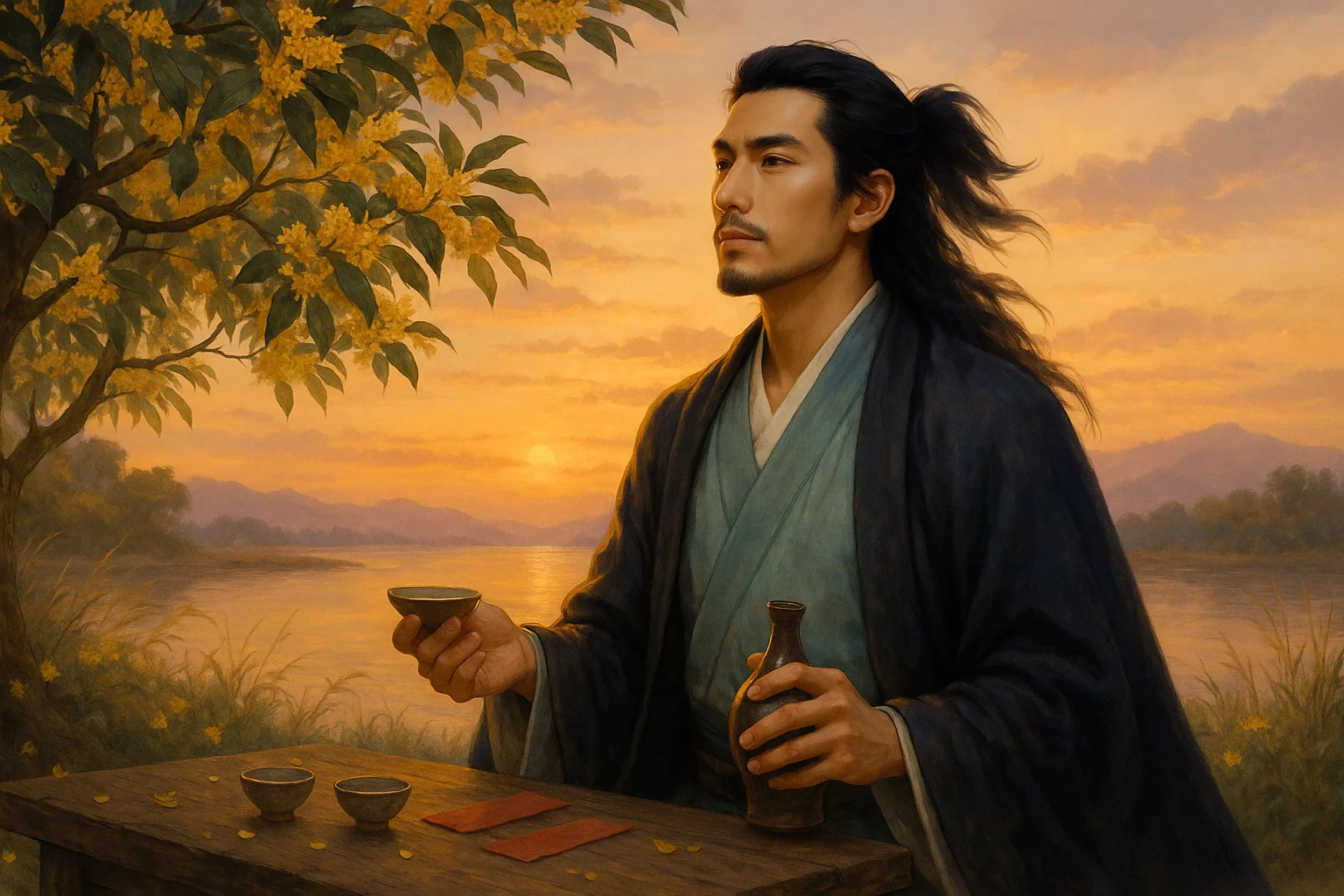
Liu Guo (刘过 1154 - 1206), a native of Taihe in Jiangxi, was a ci poet of the Bold and Unconstrained School (haofang pai) during the Southern Song Dynasty. Though he remained a commoner all his life, wandering the rivers and lakes, he associated with literary giants like Lu You and Xin Qiji. His ci poetry is impassioned and heroic, and his verse is vigorous and forceful. Stylistically close to Xin Qiji but even more unrestrained, Liu Guo became a central figure among Xin’s poetic followers.






